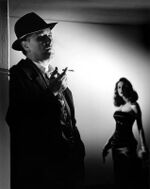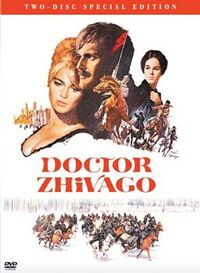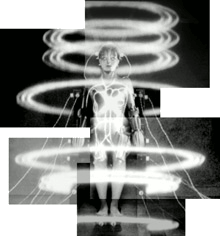Portal:Film
| Welcome to Uncyclopedia's Film portal. |
Film is an important mechanism; films entertain, misguide, confuse, and distract audiences, thus producing a society of sheep that industry and politics require on to keep those dollars rolling in. However, to avoid panic, it's commonly just lumped under the category of art.
The visual elements of cinema need no translation, giving the motion picture a universal power of communication. This is why that breasts, explosions, and car chases are as deeply cherished and understood in the United States as they are in Wherethefrickistan.
Films are also artifacts created by specific cultures, which reflect those cultures, and in turn, affect them. It is commonly agreed however that none of these will be worth digging up and featuring in the Smithsonian, regardless of the number of years old.
Traditional films are made up of a series of individual images called frames. When these images are shown rapidly in succession, a viewer has the illusion that motion is occurring. The viewer cannot see the flickering between frames due to a combination of physiological and psychological effects. One is known as persistence of vision — whereby the eye retains a visual image for a fraction of a second after the source has been removed. The other is known as hooch — whereby audiences sneak in potato vodka and other homemade alcohol under their jackets, to save money at the concession and to increase the enjoyment of the movie.
The origin of the name "film" comes from the fact that photographic film (also called film stock) has historically been the primary medium for recording and displaying motion pictures. Many other terms exist for an individual motion picture, including picture, picture show, photo-play, flick, and most commonly, movie. Additional terms for the field in general include the big screen, the silver screen, the cinema, and the movies.
| More about Film... |
Selected article
A Day In the Life of Armond White is a 3rd person novel written by a Rolling Stones editor as part of a story. The books details encounters with people by skilled film critic Armond White and his reactions to these situations. Hailed by critics, one wrote "a different tone...we rarely see someone so laughable". The entire text is preserved below:
Foreward
In a strange, roundabout way, we can all relate to Armond White. The stuffy Englishman from the 1940s, the high class man at the Opera...all of the things that seem like they don't belong can be traced back to Mr. White. In this book, provided by Mr. White's personal journals, we detail what it would be like to be Armond White for a day. I hope you enjoy this book as much as I laughed while writing it.
Armond's alarm buzzed on his dresser. Grudgingly, he got up from his bed. Another day with the minimalists and capitalists that are destroying the movie industry, he thought. After putting on his clothes, he ascended the stairs to his kitchen.
"Honey!" His wife called. "I made you breakfast before you go to work. What do you think?"
Selected picture
What's On?
2001: A Space Odyssey • Albanian interpretationalist cinema • Blade Runner • Carry On Films • Donnie Darko • Dr. No • Eadweard Muybridge, Zoopraxographer • Eraserhead • G Rated Talking Animal Movie • Passion of the Christ 2 • Pirates of the Caribbean • Robert's Rules of Order: The Movie • Surprise Ending • Terminator • The Wizard of Oz • You Don't Mess with the Zohar •
Categories
Selected biography
Karin? Are you there, Karin? There is…there is something of great importance I want to talk to you about, child. My whole life I’ve felt confused, and incomplete, and depressed, and inadequate, and lost, and empty, and unnatural, and just yesterday Agnes told me my breath smelled of herring and pickled cabbage and that I should brush my teeth more often. I’m just so depressed, Karin, so totally and utterly depressed, my child, and that’s why I’ve called you in here. Karin, are you, per chance, familiar with the work of Swedish filmmaker Ernst Ingmar Bergman?
News
Did you know...
- Nicolas Cage started life as Nicholas Coppola, but became known by his current surname because famous film director Uncle Francis Ford Coppola used to keep him confined for protection. Ours. There's no official explanation as to how he was released, but the results have only confirmed Coppola's original wisdom.
Things you can do
Featured content
Main topics
Terms - Animation • Beta movement • Camera • Cult film • Digital cinema • Documentary • Experimental film • Fan film • Film criticism • Film festival • Film journals and magazines • Film industry • Film theory • History of film • Lost film • Narrative film • Open content film • Persistence of vision • Photographic film • Propaganda • Silent film • Sound stage • Web film • World cinema
| L.A. Confidential |








